How to Apostille a Document in the Philippines 2025
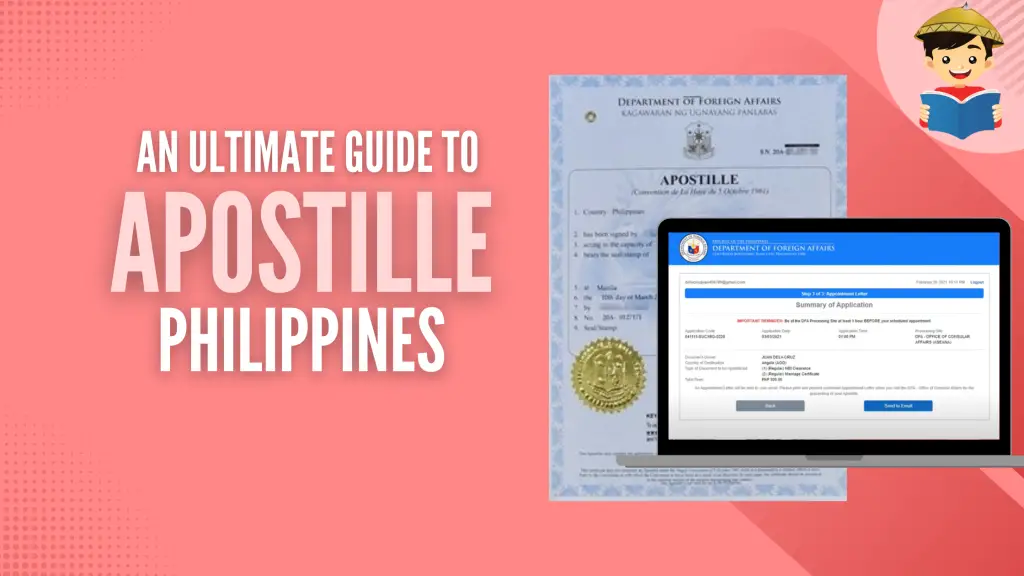
Aside from processing Philippine passports, the Department of Foreign Affairs (DFA) is also tasked with authenticating documents.
Known as “red ribbon” authentication, the process involves affixing red satin ribbons to public documents that will be used abroad.
Since June 17, 20191, DFA has officially stopped issuing “red ribbons,” which have been replaced by Apostille certificates following the Philippines’ accession to the Apostille Convention.
What exactly is an Apostille certificate, and how does it differ from the “red ribbon” certificates we’re all familiar with?
In this guide, we’ll cover everything about this new authentication process and how it has made processing documents to be used abroad more effortless than ever before.
Table of Contents
What Is an Apostille?
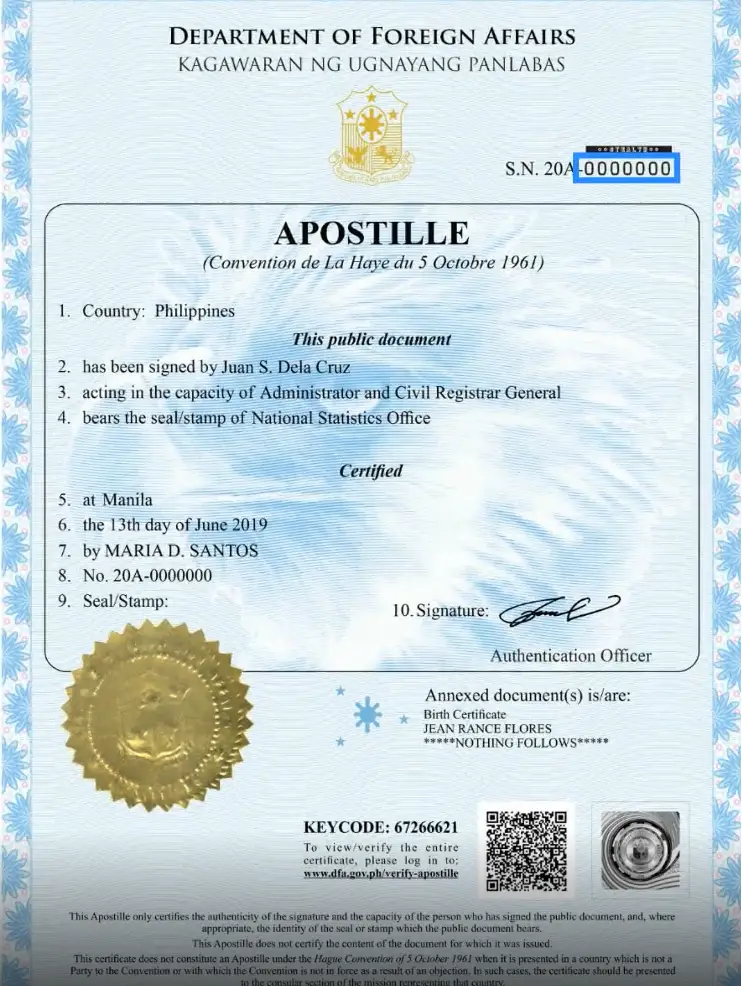
An Apostille is a certificate that proves the authenticity of the public official’s signature on a document for use in another country. It’s proof that the person or institution who issued the document is known to the government of its source country, that whoever issued it is authorized to do so, and that the document is genuine.
Why Do You Need To Authenticate a Document?
Let’s say you have a PSA birth certificate.
Birth certificates in the Philippines and those issued by other countries don’t look the same. They’re also not processed in the same way.
So how can a foreign country accept a document (in this case, a birth certificate) from a completely different country with different laws and cultures?
This is when authentication enters the picture.
Since the 1963 Vienna Convention on Consular Relations, embassies or consulates worldwide have followed the same authentication procedure to ensure that a document processed in a particular country remains valid in another country.
For this reason, the purpose of having your documents authenticated by DFA is to ensure embassies or consulates in other countries that the said documents have been carefully reviewed, examined, and subjected to an agreed-upon authentication procedure.
In other words, the DFA authentication guarantees foreign embassies that whatever document you’re submitting is not fake and was released by a recognized Philippine government agency.
DFA “Red Ribbon” Versus Apostille Certificate: What’s the Difference?
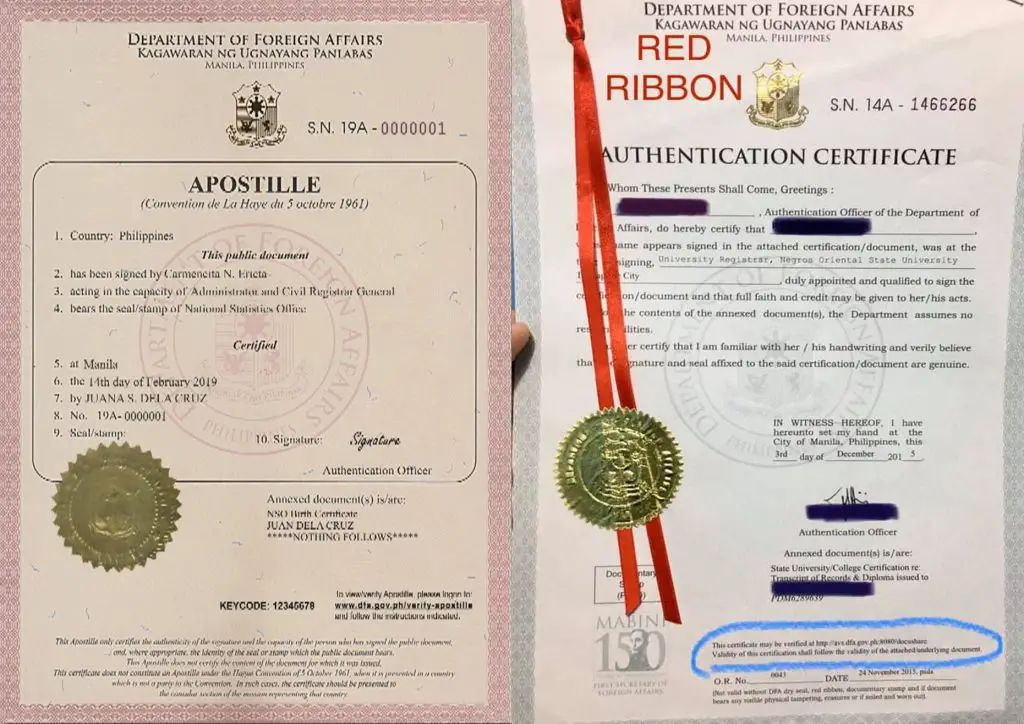
Filipinos became so familiar with “red ribbons” that whenever their foreign employers asked them to authenticate certain documents, they immediately associated this procedure with “red ribbons.”
However, starting June 17, 2019, DFA stopped issuing “red ribbon” certificates to authenticate public documents that will be used abroad.
The “red ribbons” have been replaced by Apostille certificates. This new procedure is designed to streamline the authentication process.
Here’s a summary of the difference between the two documents:
| Red Ribbon Document | Apostille Certificate |
| It features a gold seal over two red ribbons fastened to the same side. | The new version (blue) shows a gold seal, a QR code, and the signature of the Authenticating Officer. |
| It took longer to process as the document must be authenticated by DFA before it can be submitted to the foreign country’s consulate in the Philippines for certification/legalization. | Simpler and faster to process as the document only requires DFA authentication. |
On September 12, 2018, the Philippines formally acceded to the Apostille Convention in The Hague, Netherlands.
The Apostille Convention is an international treaty where all signatory countries agree that another signatory country can accept documents issued by one signatory country without undergoing additional consular authentication.
Now, this is what makes the Apostille certificate different from the discontinued “red ribbon” certificates.
In the old system (see image below), you couldn’t use a Philippine-issued document abroad unless it’s authenticated by DFA and then legalized by the Foreign Embassy with jurisdiction over the country where the document will be used.
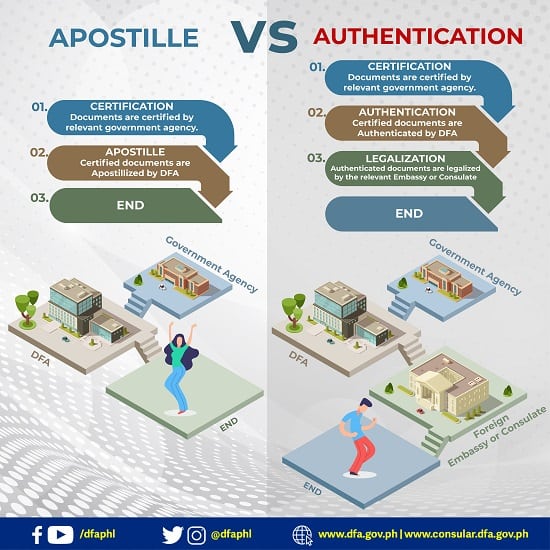
By contrast, the Apostille certificate enables Filipinos to use their authenticated documents in any Apostille-contracting country without going through another consular authentication or legalization procedure.
In other words, you only need to go to the DFA to authenticate your documents. There’s no longer a need to go to the Consular Office of your destination country, making the whole process easier, faster, and cheaper.
Which Countries Accept the Apostille Certificate for Authenticated Documents?
As mentioned, an Apostille certificate issued by DFA in the Philippines is only accepted by other countries that are also signatories to the Apostille Convention.
Please check out this link or see the image below for a complete list of Apostille-contracting countries.
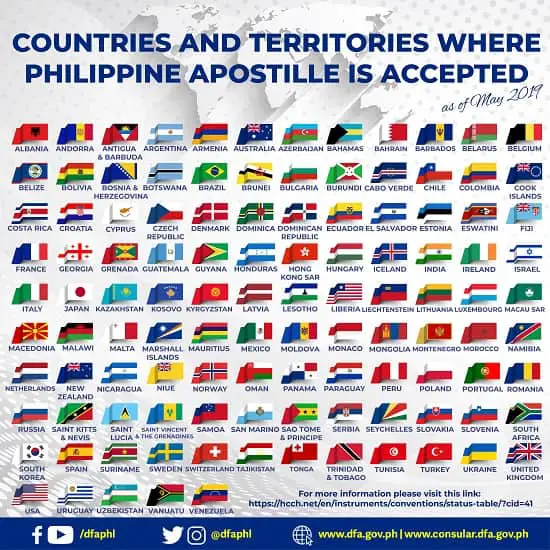
Apostille certificates are NOT accepted in Austria, Germany, Greece, and Finland.
List of Documents That Can Be Authenticated and Get an Apostille Certificate
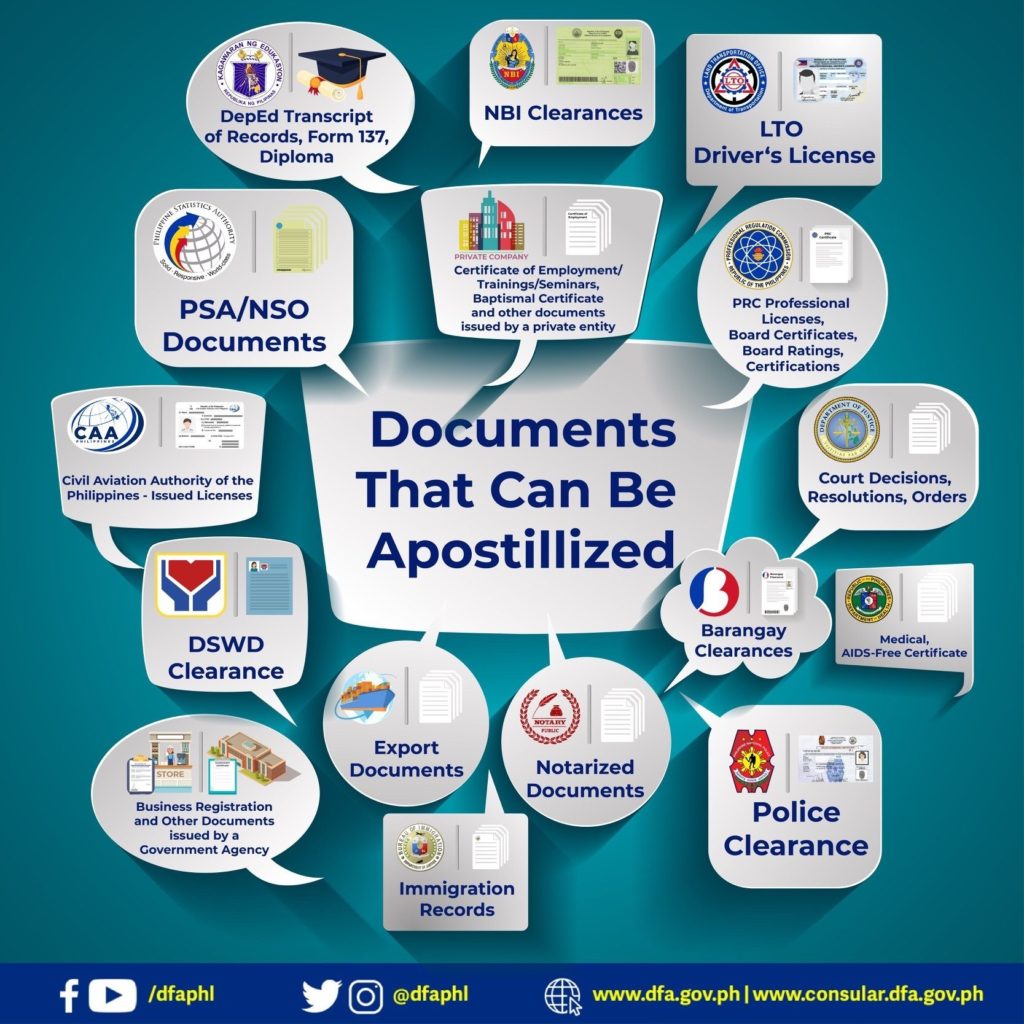
All documents released by local government units, government agencies, judicial courts, public schools, and state universities subject to DFA authentication can be Apostilled2.
If a private entity releases a document, it must be notarized first and then issued with a Certificate of Authority for Notarial Act (CANA) by the supervising Regional Trial Court before it can be apostilled.
The Department of Foreign Affairs (DFA) offers authentication services for the following documents:
1. Transcript of Records (TOR) and Diploma (For State Colleges and Universities)
- Only bring Certified True Copies from the school.
- Documents must have the Certification, Authentication, and Verification (CAV) from the school and be signed by the school/university registrar and/or the school’s authorized signatory.
2. Transcript of Records (TOR) and Diploma (Private Schools and Local Universities and Colleges)
- Only bring Certified True Copies from the school.
- Documents must have the Certification, Authentication, and Verification (CAV) from the Commission on Higher Education (CHED) where the school is located.
3. Transcript of Records (TOR) and Diploma/National Certificate (Technical or Vocational Courses)
- Only bring Certified True Copies from the school.
- Documents must have the Certification, Authentication, and Verification (CAV) from the Technical Education and Skills Development Authority (TESDA) where the school is located.
4. Form 137 and Diploma (High School and Elementary Level)
- Only bring Certified True Copies from the school.
- Documents must have the Certification, Authentication, and Verification (CAV) from the Dep-Ed Regional Office where the school is located.
5. Medical Certificate/AIDS-Free Certificate
- If for employment, a DOH stamp per document is required.
- If the document is used for other purposes, please obtain the Certification issued by DOH with the attached Medical Certificate.
6. Civil Aviation Authority of the Philippines (CAAP) Issued Licenses
- Must be certified/authenticated by CAAP.
7. Driver’s License
8. Professional Licenses/Board Certificates/Board Ratings/Certifications and Other PRC Documents
- Must be Original
9. Certificate of Employment/Invitation Letter/Training/Seminars, Baptismal Certificate, and Other Documents Issued by a Private Entity
- A notarized affidavit must state the necessary factual circumstances and indicate the certificate/s as attachment/s.
- Please secure a Certificate of Authority for a Notarial Act (CANA) signed by the Executive Judge/Vice Executive Judge/any office authorized signatories (issued by the Regional Trial Court).
- Note that the copy of the Notarial Commission is not the same as the Certificate of Authority for a Notarial Act (CANA).
10. Special Power of Attorney (SPA)/Memorandum of Agreement/Memorandum of Understanding/Any Other Form of Contract/Affidavit of Consent or Advice/Joint Affidavit/Other Affidavits
- Please secure a Certificate of Authority for a Notarial Act (CANA) signed by the Executive Judge/Vice Executive Judge/any office authorized signatories (issued by the Regional Trial Court).
11. Court Document/s (Decisions/Resolutions/Orders)
- Only bring true certified copies of the document/s.
12. Immigration Records
- Must be certified/authenticated by the Bureau of Immigration (BI).
13. DSWD Clearance
- This refers to the travel clearance for minors issued by the Department of Social Welfare and Development (DSWD). Only bring the original documents issued by DSWD.
14. NBI Clearance/Sundry
- The personal copy of the NBI clearance won’t be accepted.
- It must be an original document issued by the NBI with a dry seal.
- The NBI clearance to be authenticated must be issued by the National Bureau of Investigation. Note that NBI clearance is now “multi-purpose,” so the green clearance annotated for travel or work abroad is no longer issued.
15. Police Clearance/Sundry
- DFA accepts original police clearances issued by the Philippine National Police (PNP).
16. Barangay Clearance/Certificate
- Mayor’s Clearance or Certification with jurisdiction over the Barangay of the applicant’s residence.
17. Export Document/s
- Depending on what type of export document you have, it must be certified/authenticated by any of the following: Department of Health (DOH), Philippine Chamber of Commerce (PCCI), Bureau of Food and Drugs (BFAD), or Department of Agriculture (DA).
18. Business Registration and Other Documents Issued by a Government Agency (e.g., SEC, DTI, BIR, SSS, Municipal Business Permit & Licensing Office, etc.)
- It must be a Certified True Copy from the issuing office.
19. Birth/Marriage/Death Certificate, Certificate of No Marriage Record (CENOMAR, Advisory on Marriage, and/or Negative Records)
- It must be an original document issued by the National Statistics Office (NSO) or the Philippine Statistics Authority (PSA).
- If it’s a newly registered record, the Local Civil Registrar (LCR) copy should be certified by the PSA.
- If any of the entries from PSA/NSO are unclear, please provide a Local Civil Registrar (LCR) copy of the Birth (Form 1A)/Death (Form 2A)/Marriage (Form 3A) Certificate.
Requirements To Get an Apostille Certificate in the Philippines
Before going to the DFA office, ensure that you already have the following documentary requirements:
a. At least one valid government-issued ID
You can bring the original and photocopy of one of the following:
- Digitized government-issued IDs bearing the applicant’s signature, except Pag-IBIG Loyalty Card
- Senior Citizen, PWD, Solo Parent, Voter’s ID/Certification, Passport, Seaman’s Book, Alumni ID
- Digitized Student ID (valid for the duration of his studies up to 1 year upon graduation)
b. If authorized representative, please bring the following:
- Authorization Letter from the owner
- Photocopy of the owner/applicant’s ID
- Original and photocopy of the representative’s ID
- If the owner/applicant is a minor, original Special Power of Attorney (SPA) from the parents
c. Document/s to be authenticated (see the previous list of documents)
How Much Does Apostille Cost in the Philippines?
Document authentication costs depend on whether you prefer to expedite or stick to regular processing. For expedite, you can receive the Apostille after one to two working days for the cost of ₱200 per document. On the other hand, standard processing takes three to five working days for a cheaper fee of ₱100 per document (Office of Consular Affairs [OCA], 2023).
How to Apostille a Document in the Philippines
Option 1: Walk-in Application
Some DFA branches have a walk-in facility that processes authentication requests. However, note that there are limited slots per day depending on the capacity of the Consular office. The earlier you arrive, the higher your chances of being accommodated.
Apostille is available in the following Authenticating Units of the DFA:
- DFA – OCA (Oceana
- CO Cagayan De Oro
- CO East (SM Megamall)
- CO Northeast (Ali Mall)
- CO South (Alabang)
- CO West (SM Manila)
- CO La Union
- CO Iloilo
- CO Cebu
You may only avail of the walk-in facility if you are the document owner (i.e., the document to be Apostilled is under your name) or if you are an authorized representative requesting on behalf of an immediate family member whose name is on the document to be Apostilled.
Option 2: Online Appointment
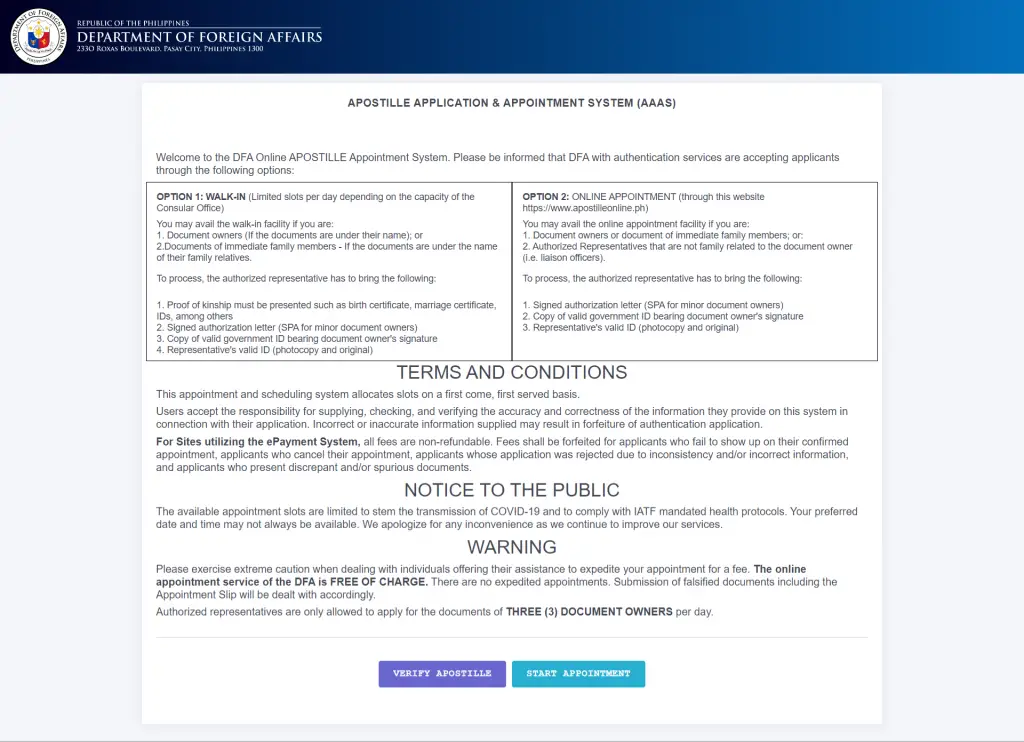
If you’re not in a hurry, you can secure an online appointment with DFA instead so you can have your document/s authenticated on your preferred day and time. However, the appointment slots are given on a first-come, first-served basis, so make sure to get an appointment as soon as possible. Follow the steps below to learn how to get a slot.
- Go to the Apostille Application & Appointment System (AAAS)
- Scroll down to the bottom of the page and click Start Appointment
- If this is your first time using the appointment system, click Create New Account to register
- Provide your name, contact information, and password. Click the appropriate box to accept the Terms and Conditions. Finally, click Register
- Open the notification sent to your registered email address and click the link to confirm your registration. This will redirect you to the AAAS. Scroll down to the bottom of the page again and click Start Appointment
- Log in with your registered email address and password
- Select Start New Appointment. A dialog box reminding you about the documentary requirements for each document type will appear. Read it entirely and click OK
- Complete the registration. If you’re the authorized representative, provide the document owner’s name, date of birth, and country of destination; otherwise, tick the box that says, “Are you a Document Owner?” Select the type of document to be authenticated from the drop-down list provided; if you’re requesting a different kind of document, click “Yes” for the question “Do you want to add another document?” Once you’re done, click Next
- Select the site where you wish to apply for an Apostille. Click Next
- Select the date and time when you wish to apply for an Apostille. Click Next. A dialog box that says “Generate Appointment” will appear on your screen. Click Ok, and a PDF copy of your Online Apostille Application & Appointment Letter (see image below) will be automatically downloaded. This letter contains the summary of your appointment, including your appointment code, appointment date and time, and the fee that you’re going to pay on site
- Print this letter and present it to the Appointment Verification Counter on the day of your appointment
- Once it’s your turn, proceed to the processing window and present your valid ID together with the documents
- Pay the corresponding fee to the Cashier
- Bring your original ID and the official receipt on the scheduled date and time of release to claim the Apostille certificate
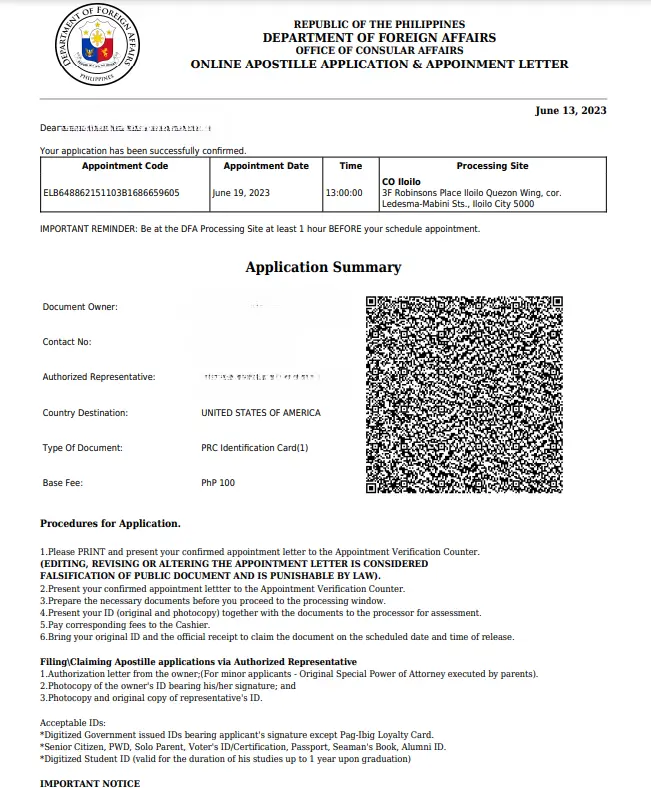
Tips and Warnings
- Apostilles do not expire.
- Authorized representatives can only request the authentication/Apostilization of documents of up to three (3) document owners daily.
- Apostille certificate only certifies the origin of the document or the person/authority whose signature/seal appears on the public document. It doesn’t certify the content of the said document.
- Apostille certificates only apply to public documents that will be used abroad. Authentication and the Apostille certificates will not be issued to documents that will only be used locally.
- Suppose the country of your destination is one of the excluded countries or not a signatory to the Apostille Convention. In that case, you may need to go to that country’s Consular Office/Embassy and have your documents legalized/certified. For more information, please contact the Foreign Embassy or the intended recipient of your documents to see what options are available.
- Altering or revising information presented in your appointment letter is prohibited. All necessary corrections will be made on the DFA site during your appointment.
Frequently Asked Questions
1. How can I verify if my Apostille certificate is authentic or genuine?
Note that you can verify the authenticity of an Apostille Certificate by using the DFA Apostille Verification System. Enter the Apostille number (located in the upper-right portion of the document) and keycode (left of the QR code) in the fields provided. If your certificate is verified, an image of it will appear on your screen.
You can also scan the QR code in the certificate using your mobile device. If the certificate is verified, an image of it will also appear on the screen.
An authentic Apostille Certificate usually includes the following features:
a. A dry seal of the DFA
b. Signature of the Authentication Officer
c. QR code
d. Eight-digit keycode
If you cannot verify your Apostille on the DFA site, email [email protected] and attach a copy of the certificate.
2. I won’t be able to claim the Apostille certificate on the scheduled date and time of release. What should I do?
You can still claim it but don’t wait three months from the release date to claim the Apostille certificate. This is because DFA disposes of all unclaimed documents three months after the scheduled release date.
Getting rid of unclaimed documents is a measure applied by DFA to minimize the risk of fire hazards and provide storage space for newly authenticated documents.
3. I will use a document for a foreign country that doesn’t require an Apostille document. What should I do?
Contact the country’s embassy or consulate. These countries have their specific conditions regarding the authorization of documents. They will inform you regarding some available options for you.
References
- PH Does Away with Red Ribbons on Authentication Certificates. (2019). Retrieved 12 August 2022, from https://dfa.gov.ph/dfa-news/dfa-releasesupdate/23009-ph-does-away-with-red-ribbons-on-authentication-certificates
- Authentication FAQs. (n.d.). Retrieved October 4, 2022, from https://dfa-oca.ph/authentication/authentication-faqs/
Luisito Batongbakal Jr.
Luisito E. Batongbakal Jr. is the founder, editor, and chief content strategist of FilipiKnow, a leading online portal for free educational, Filipino-centric content. His curiosity and passion for learning have helped millions of Filipinos around the world get access to free insightful and practical information at the touch of their fingertips. With him at the helm, FilipiKnow has won numerous awards including the Top 10 Emerging Influential Blogs 2013, the 2015 Globe Tatt Awards, and the 2015 Philippine Bloggys Awards.
Copyright Notice
All materials contained on this site are protected by the Republic of the Philippines copyright law and may not be reproduced, distributed, transmitted, displayed, published, or broadcast without the prior written permission of filipiknow.net or in the case of third party materials, the owner of that content. You may not alter or remove any trademark, copyright, or other notice from copies of the content. Be warned that we have already reported and helped terminate several websites and YouTube channels for blatantly stealing our content. If you wish to use filipiknow.net content for commercial purposes, such as for content syndication, etc., please contact us at legal(at)filipiknow(dot)net
